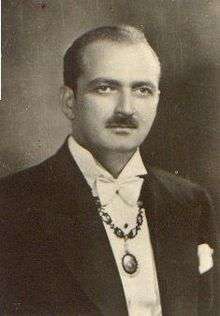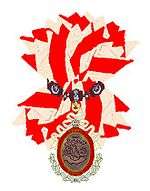Mahmud Namik Efendi
| Mahmud Namık (or Namuk) | |
|---|---|
| His Imperial Highness Prince Şehzade Mahmud Namık Efendi | |
 | |
| Born |
23 December 1913 Dolmabahçe Palace, Istanbul , Turkey |
| Died | 13 November 1963, Cairo, Egypt |
| Spouse | Shehrazad Ratib Hanim Efendi |
| Issue | Prince Ömer Abdülmecid Efendi |
| House | Imperial House of Osman |
| Father | Prince Ömer Hilmi |
| Mother | Hadice Firdevs Gulnev |
| Religion | Islam |
Prince Mahmud Namık Efendi (23 December 1913; Dolmabahçe Palace-13 November 1963; Cairo, Egypt ), was the only son of Ömer Hilmi, and his wife Hadice Firdevs Gülnev Başhanımefendi, and grandson of Sultan Mehmed V Reşad. Prince Mahmud Namık was an active member of the "Zohriya Set",[1] a group of exiled members of the Ottoman dynasty who lived in the Cairo suburb of Maadi along with members of the Egyptian Royal family and their entourage.[2] Prince Mahmud Namık was implicated in the "Restoration Plot" to overthrow Gamal Abdel Nasser and replace him on the restored throne with Prince Muhammad Abdel Moneim.[3] his trial and subsequent imprisonment made headlines around the world.[4]
Birth and early childhood
Mahmud Namık was born in Dolmabahçe Palace and lived there until the death of his grandfather, Sultan Mehmed V, just before the end of World War I on 4 July 1918. He then moved with his family to a Konak (residence) at Nişantaşı for the winter months and to one in Bağlarbaşı, above Beylerbeyi, for the summer.
Exile
In March 1924, at the age of 10, Prince Mahmud Namık was sent into exile along with the entire Imperial Ottoman family, following the establishment of the Republic of Turkey and the abolition of the Ottoman Sultanate and the Ottoman Caliphate. Prince Mahmud Namık never returned to Turkey, since he died before the decree of exile was lifted in 1974. He was initially sent to boarding school in Lebanon, but then soon came to live with his family in Nice, France once they had settled there to be close to the former Ottoman Sultan Mehmed VI, who had rented a villa in San Remo, and to their cousin, the last Caliph of Islam Abdülmecid II, who lived in Nice. In 1934 he moved to Alexandria, Egypt with his father Ömer Hilmi and grandmother, and was later joined in January by his sister, Emine Mükbile, and his brother-in-law, Ali Vâsib. By the early 1940s Prince Mahmud Namık kept an apartment with his wife Şaharazad (or Shahrazad) in Maadi, a suburb of Cairo.[5]
Marriage and issue
Prince Mahmud Namık married Şaharazad Ratib on August 1939. Şaharazad was the only daughter of Ismail Ratib Bey, by his wife Princess Emine Bihruz, younger daughter of Prince Ibrahim Rashid Fazil Pasha, of Egypt. She was born in Alexandria in 1922 and died in Cairo, Egypt in 1993.[6] Upon marriage she took the title Şaharazad Hanımefendi. They had one son, Prince Ömer Abdülmecid Osmanoğlu who was born in Alexandria, Egypt on 4 June 1941. The couple were divorced at Alexandria, Egypt in 1947.
Career
Prince Mahmud Namik worked until the end of World War II for the Alexandria tramline company. In the late 1940s he established himself as a businessman and settled in Geneva, Switzerland where he developed his business interests in places as far apart as Pakistan and the USA.
Arrest, trial and imprisonment
Prince Mahmud Namik was accused of involvement in a plot to bring down the military regime of Gamal Abdel Nasser in favour of the one time Regent Muhammad Abdel Moneim or his son.[7][8] The Plot to topple Nasser had been ongoing since before the Suez Crisis of 1956 and was supported at various times by the British M16 and the French.[9]
In 1958 he was asked to help negotiate the marriage of his cousin Princess Sabiha Fazila Hanimsultan, the only daughter of Prince Muhammad 'Ali Ibrahim Beyefendi of Egypt and Princess Zehra Hanzade Sultan, to King Faisal II of Iraq. The engagement was ended by the murder of King Faisal II, following a military coup on 14 July 1958.
Death
Mahmud died at the age of 49 from a stroke, at Cairo, Egypt on 13 November 1963, was buried at Khedive Tawfik Mausoleum in Cairo, then transferred to Sultan Mahmud II Mausoleum in Istanbul in 1987.
Honours
He received the Collar of the Hanedan-ı-Ali-Osman. The order was created in 1895 by Abdul Hamid II It was awarded only to members of the Imperial Family and foreign Royalty with the exception of the Grand Vizier Tewfik Pasha. The order was officially awarded on only 50 occasions and is now informally passed down through the family.[10]

Family tree
Showing the line of descent from the founder of the Ottoman dynasty to present day through Sultan Mehmed V Reşad's youngest son Prince Ömer Hilmi Efendi

References
- ↑ http://newswatch.nationalgeographic.com/2013/06/24/lost-for-decades-a-beguiling-curio-from-egypts-royal-past/
- ↑ "Maadi'S Ottomans". Egy.com. Retrieved 2014-05-01.
- ↑ Kyle, Keith, Suez: Britain's End of Empire in the Middle East p.148-9
- ↑ "NESLISHAH SULTAN 1921-2012". Egy.com. Retrieved 2014-05-01.
- ↑ "Maadi'S Ottomans". Egy.com. Retrieved 2014-05-01.
- ↑ "Egypt6". Royalark.net. Retrieved 2014-05-01.
- ↑ Egypt Investigates Anti-Nasser Plot, The New York Times, 28 December 1957
- ↑ "NESLISHAH SULTAN 1921-2012". Egy.com. Retrieved 2014-05-01.
- ↑ "Adel Sabit". Telegraph. 2001-03-26. Retrieved 2014-05-01.
- ↑ "Milyen rendi láncot visel IV. Károly | Érdemrendek - Kitüntetések - Egyenruhák". Erdemrendek-kituntetesek.hu. 2014-01-24. Retrieved 2014-05-01.
Bibliography
- Osmanoğlu, Osman Selaheddin (2003). Bir Şehzadenin Hâtırâtı. Turkey: Yapı Kredi Yayınları. ISBN 9750808789. OCLC 469568294. Retrieved 2011-07-20.
External links
- "Ottoman Family". Official website of the immediate living descendants of the Ottoman Dynasty. Retrieved 2010-02-14.
- "Genealogy of the Ottoman Family". Retrieved 2008-08-19.
- Family Tree, descendants of Sultan Mahmud II. Retrieved 2011-02-28.